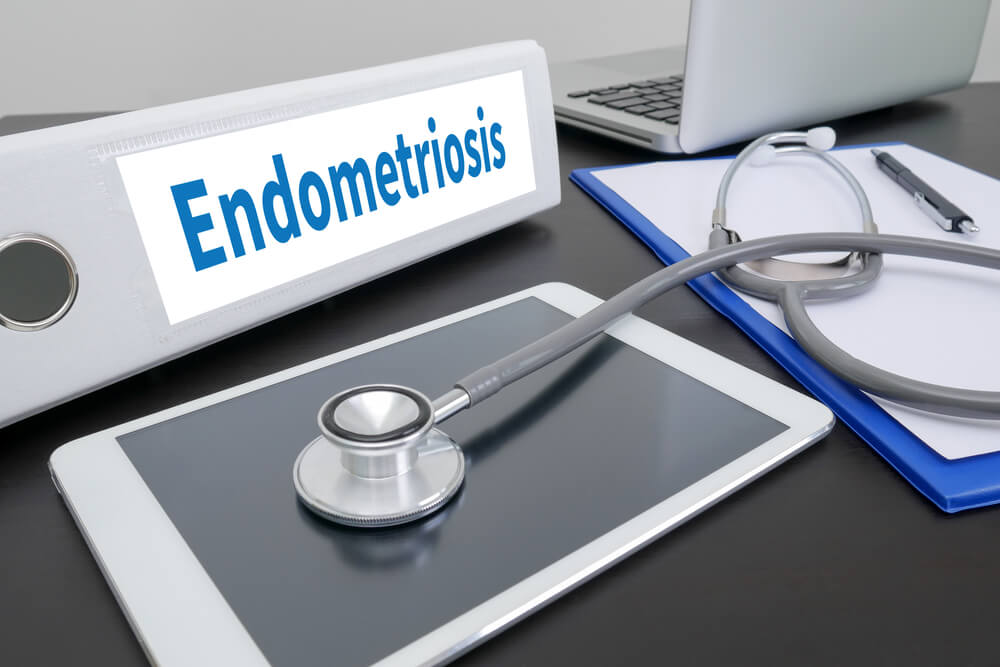Disclaimer: Please note that this blog is for educational purposes only, it includes general information on health-related topics. Women’s Healthcare of Boca Raton is giving medical advice to Patients Only. Follow this link to request an appointment with Dr. Ellman.
Endometriosis, as you might know, is a condition that negatively affects the reproductive system in women, due to the fact that the endometrium (the tissue of the uterine lining) grows outside of the uterus and causes inflammations in different parts of the body such as the pelvis, the fallopian tubes and alike.
This condition very often does not permit women to have children, causes a very painful menstrual cycle, and generally has a very problematic impact on women’s overall health. Although it is very uncommon for this condition to be cured and disappear, there are different treatments for endometriosis that can elevate the symptoms and help with the pain.
Endometriosis diagnosis can be given through many different exams and check-ups, and today’s article will elaborate in more detail on each particular approach.
The information given in the text in front of you will be very helpful when seeking services of gynecologic surgery in Boca Raton and any other potential treatments you might need to be able to control the symptoms of your endometriosis. Additionally, it is extremely important to choose an expert to monitor your condition, and Dr. David Ellman is, for sure, an option worth exploring further.
Endometriosis Diagnosis

The first step of any diagnosis is your conversation with your doctor. During that phase, the doctor can ask you different questions about your daily habits, pain levels, medication you take, family anamnesis, your personal health history, etc. As mentioned, there are different ways of diagnosing endometriosis, so in accordance with the symptoms you are experiencing, your chosen doctor will be able to determine the approach they want to take.
Make sure you give your doctor all the details and do not shy away from sharing any potential information which might be uncomfortable but very useful for a correct diagnosis. People often say that half of a successful treatment is an accurate diagnosis.
Tests that are most often used to make an endometriosis diagnosis are a pelvic exam, an ultrasound, an MRI, a laparoscopy, a blood test, etc. Below you can find each one explained in more detail to help you comprehend why each test is done.
A pelvic examination is performed by a doctor who checks with their hand, i.e., manually, your pelvic area for any irregularities. In this way, the doctor can directly feel the cysts, scars, and potential endometrium growths.
Ultrasound and MRI are two techniques that are very known and popular when it comes to using a magnetic field and sound waves to create images of the inner organs. An ultrasound, in this case, can be done externally or through the vagina. Still, it will not be as detailed as possible when it comes to diagnosing endometriosis, although it does show cysts that can be connected to this condition. MRI, on the other hand, gives detailed images concerning the size and location of the growths.
Laparoscopy is a procedure that includes the usage of a laparoscope to look for endometrial tissue and to provide information about the size, location, and status of the endometrial growths. During a laparoscopy, the doctor can take a sample of the tissue, i.e., do a biopsy, to additionally test the growths. Very often, laparoscopy can also be used as endometriosis surgery, where the doctor can treat the condition during the procedure itself.
Treatments for Endometriosis

After you have gotten an adequate diagnosis and know you have endometriosis, your doctor should schedule an appointment to speak about potential endometriosis treatments.
Most often, treatments used to mitigate the symptoms of endometriosis include medication or surgery. The severity of your symptoms, as well as your plans when it comes to motherhood, is what determines the treatment path. Doctors almost always recommend traditional approaches first (medication), and if that fails, then they suggest endometriosis surgery.
Below you can find some of the most common solutions when it comes to the treatment of a condition such as endometriosis:
- When it comes to pain, doctors recommend different pain relievers such as ibuprofen, naproxen sodium, anti-inflammatory medication, which are nonsteroidal, etc. These are taken to help with menstrual cramping and the pain they bring.
- Hormonal therapy is another option medical professionals suggest to women who are suffering from endometriosis, especially when it comes to pain. As it is known, the change in hormone levels causes growths to break down and bleed, meaning that hormonal therapy can slow down the expansion of growths and help with the pain.
Unfortunately, hormonal therapy cannot be seen as a permanent solution, and the symptoms have the potential to return right after you stop taking the therapy.
This said, here are a few options which are used when the patient chooses this approach: hormonal contraception (birth control pills, patches, vaginal rings, etc.), Gn-RH agonists, which block the production of hormones and lower estrogen levels, progestin therapy (IUDs, contraceptive injection, progestin pills, etc.), aromatase inhibitors which reduce the levels of estrogen in the body and similar.
- Endometriosis surgery, or the conservative approach, is used when the patient is planning to have a baby in the future, so the doctor removes the endometrial growths to preserve the ovaries and the uterus and increase the patient’s chances for pregnancy. The most common approach is a laparoscopy, although sometimes doctors use a traditional approach, i.e., abdominal surgery.
- Fertility treatments are often needed when a patient has endometriosis because this condition can lead to infertility. The seriousness of your particular condition will dictate whether you need just stimulation of the ovaries or a proper IVF (in vitro fertilization). Whatever the case, your doctor should offer different solutions and create a plan that will reflect your needs and wishes.
- Hysterectomy and oophorectomy are two procedures that have been used in the past when the patient and the doctor wanted to achieve the most successful results when it comes to endometriosis treatment. This approach has changed significantly in the last few years. Scientists have been creating solutions that will not be as rigid as taking out the uterus and ovaries from a woman’s body just to prevent the further development of endometriosis.
When the patient gets her ovaries removed, the body will go through menopause due to a lack of hormone production. This can also increase the risk of cardiovascular diseases, heart attacks, blood vessel issues, etc. In the case of a hysterectomy, symptoms of endometriosis, such as painful periods and heavy bleeding, can be mitigated. Still, this surgery can have a long-term effect on the person’s health, so it is not advised often.
We Are Here to Help!
Suffering from endometriosis can be a painful and problematic experience for a woman. Many women fail to get impregnated due to this condition, and endometriosis treatments are often ineffective. Our clinic is here to open the doors for you and try our best to accommodate your wishes and needs with any possible option our expert team can offer. Although it is hard, we are here for you, so schedule an appointment today!

Dr. Ellman is a Board Certified OBGYN who established his medical practice in South Florida over 25 years ago. His office, Women’s Healthcare of Boca Raton, is located in Boca Raton, Florida at West Boca Medical Center. Dr. Ellman attended Albert Einstein College of Medicine of Yeshiva University, where he received his medical degree. He went on to intern at Beth Israel Hospital in Boston- an affiliate of Harvard Medical School- and continued his residency at North Shore University Hospital in Manhasset, New York- an affiliate of Cornell Medical School.
Dr. Ellman has practiced Obstetrics and Gynecology in the Boca Raton area since 1995. In addition to treating patients at West Boca Hospital, Dr. Ellman also treats patients through his own private practice, Women’s Healthcare of Boca Raton, located on the West Boca Medical Campus.

